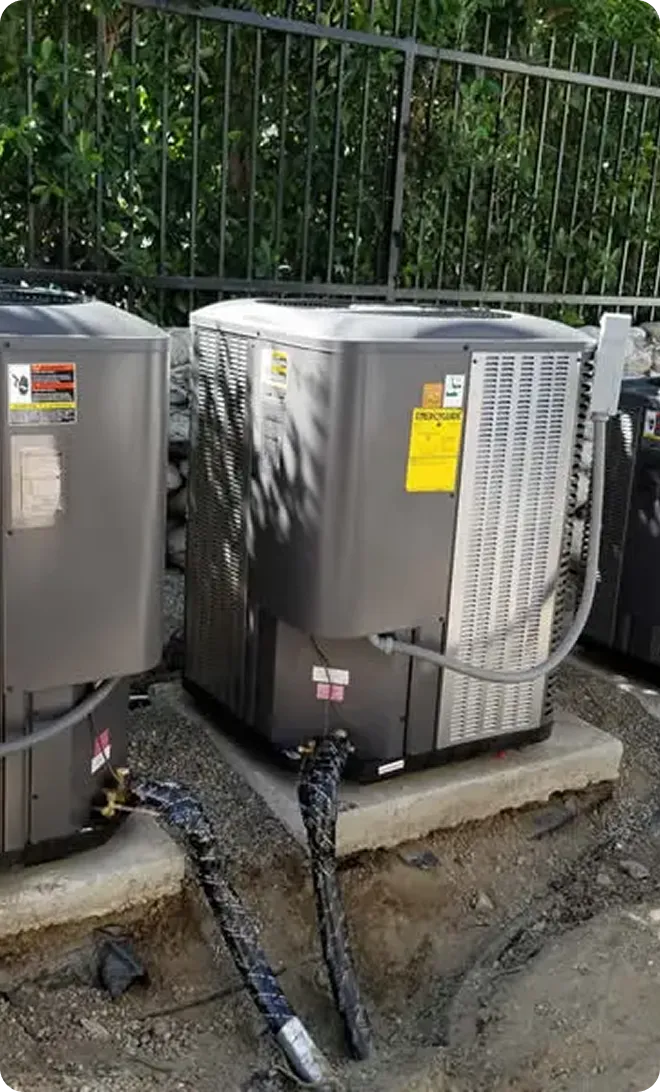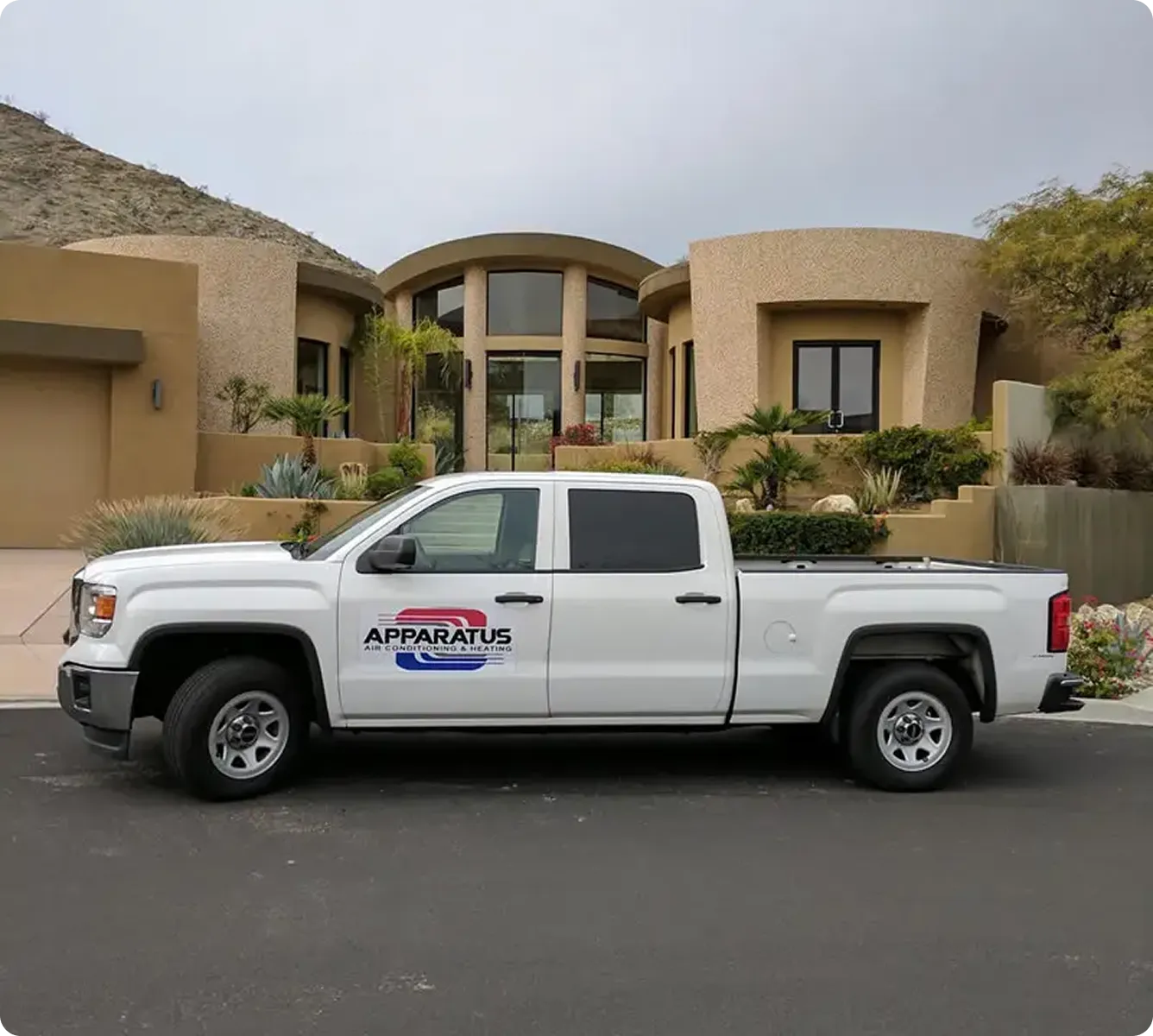
Mini Split Maintenance in North Palm Springs, CA
Mini Split Maintenance in North Palm Springs, CA
Keeping mini split systems running reliably in North Palm Springs, CA requires maintenance tuned to desert conditions. Routine mini split maintenance protects comfort, reduces energy use, and prevents costly mid-summer failures.
.jpg)
Why mini split maintenance matters in North Palm Springs
North Palm Springs experiences long, hot summers, intense sun exposure, frequent dust and sand, and occasional monsoon storms. Those conditions accelerate wear on mini split components:
- Dust and sand clog filters and coils faster, reducing airflow and efficiency.
- High heat increases compressor workload and electrical stress.
- UV exposure and temperature swings degrade outdoor unit plastics, insulation, and line set jacketing.
- Monsoon debris and wind-blown grit can block outdoor condenser fins and clog condensate drains.
Regular maintenance reduces the impact of these regional stressors, extending equipment life, maintaining cooling capacity, stabilizing energy costs, and preserving manufacturer warranties.
Common mini split issues in North Palm Springs homes
- Reduced cooling or warm spots in rooms during peak heat
- Increased energy bills without a change in thermostat use
- Unit short cycling or running continuously
- Water leaks or overflow from indoor units caused by clogged condensate drains
- Unusual noises from indoor or outdoor units (rattling, grinding, or hissing)
- Ice build-up on evaporator coils from restricted airflow or low refrigerant
- Visible corrosion, damaged line insulation, or deteriorated outdoor fan blades
These symptoms often start small but escalate quickly under desert conditions, making timely preventative care essential.
Standard mini split maintenance checklist
A thorough tune-up typically includes these core tasks, adjusted to the system manufacturer specifications:
- Visual system assessment of indoor and outdoor units
- Filter cleaning or replacement (washable or disposable)
- Indoor evaporator coil cleaning and inspection
- Outdoor condenser coil cleaning and fin straightening
- Refrigerant level and pressure checks for proper charge
- Electronic leak scan when pressure or performance is out of range
- Electrical inspection: contactor, capacitors, wiring, breakers, and connections
- Amp draw and voltage testing for compressor and fan motors
- Thermostat and control calibration and firmware checks on smart units
- Condensate drain and trap cleaning to prevent clogs and water damage
- Line set insulation inspection and re-jacketing where degraded
- Lubrication of accessible moving parts per manufacturer guidance
- Operational performance test: temperature split and run-cycle evaluation
For North Palm Springs, add more frequent filter and coil attention because dust accumulation is rapid.
Seasonal tune-up process — what to expect
- Pre-season inspection (spring): focus on refrigerant levels, coil cleaning, and ensuring outdoor condenser is free of winter debris and sun-related deterioration before cooling season. This is the most important visit for summer readiness.
- Mid-season check (summer): spot check filters, airflow, and electrical loads. Address minor issues before peak heat.
- Post-monsoon service (late summer/early fall): remove mud, grit, and debris tracked into outdoor units; check for water intrusion and dried mud in condensate lines.
- Annual off-season check (fall/winter): verify system readiness for occasional heating mode use, check reversing valves and any heat pump functions, and inspect for corrosion or insulation degradation.
Systems in high-dust locations or with heavy indoor use may benefit from biannual filter and coil attention.
Diagnostics and performance testing explained
Technicians use a combination of visual inspection and measured diagnostics to confirm system health:
- Temperature split: measuring supply and return temps to assess cooling efficiency.
- Refrigerant pressure and superheat/subcooling readings: determine correct charge and detect leaks.
- Electrical testing: voltmeter and clamp meter readings to detect failing capacitors, motors, or poor connections that cause overheating or failure.
- Leak detection: electronic detectors or soap test on fittings; dye or UV tracer when needed.
- Airflow assessment: checking airflow across indoor coils and verifying fans operate at correct speeds.
- Control system review: ensuring remote thermostats and control boards respond and cycle correctly.
These diagnostics identify whether a simple cleaning or a more complex repair is required.
Typical repairs and when they are needed
- Capacitor replacement when motors struggle to start or run inefficiently.
- Fan motor repair or replacement for noisy or non-functioning fans.
- Refrigerant leak repair and recharge only as part of a successful leak fixing process; systems should not be topped off repeatedly without repair.
- Drain line clearing and condensate pan treatment to stop recurring water issues.
- Replacing damaged line set insulation and re-sealing refrigerant connections to prevent loss and thermal inefficiency.
- Control board or sensor replacement if diagnostics show erratic cycling or incorrect temperature reporting.
Repair decisions should prioritize safety, manufacturer specifications, and long-term cost effectiveness given the harsh local climate.
Benefits of preventative mini split maintenance
- Extended equipment life and delayed replacement costs
- Stable and improved cooling performance during extreme summer heat
- Lower monthly energy consumption through optimized operation
- Reduced risk of emergency failures during heat events
- Better indoor air quality with clean filters and coils
- Preservation of warranty requirements that often mandate scheduled maintenance
In North Palm Springs, the ROI on routine maintenance is amplified because the harsh environment accelerates component wear.
Maintenance agreement options and scheduling windows
Maintenance programs can be tailored to homeowner needs and local climate patterns. Common agreement structures include:
- Annual tune-up plan: one comprehensive pre-summer visit with a checklist of diagnostics, cleaning, and adjustments.
- Biannual service plan: pre-summer and post-monsoon or mid-summer checks for homes with higher dust exposure or high-usage systems.
- Priority maintenance bundle: scheduled visits timed to manufacturer recommendations with discount for bundled services and priority scheduling during peak season.
- Transferable agreement option: maintenance packages that move with the property, preserving resale value and warranty adherence.
Suggested scheduling windows for North Palm Springs:
- Pre-cooling season: March to early April to prepare for peak heat.
- Mid-summer check: June to July for systems under heavy load.
- Post-monsoon service: September to October to remove storm debris and address moisture-related issues.
- Annual off-season check: November to February for heating-related functions and corrosion inspection.
Regularly scheduled maintenance aligned to these windows helps avoid the most common desert-driven failures and keeps mini split systems operating efficiently.
Final notes on maintenance priorities
Prioritize filter and coil cleanliness, refrigerant integrity, electrical component health, and condensate management when servicing mini splits in North Palm Springs homes. Properly timed maintenance pays for itself by lowering energy use, improving comfort during extreme heat, and decreasing the chance of mid-season breakdowns. Routine attention to these elements keeps mini split systems reliable year after year in the desert climate.

hear what our satisfied
clients have to say









.webp)